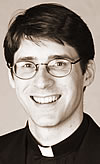Lay preaching in the Catholic Church was the topic of a recent story in the StarTribune newspaper. The Catholic Spirit asked Father John Paul Erickson, director of the archdiocesan Office of Worship, to answer a few questions on the topic to clarify the church’s teaching.
Q: What does the church teach about lay people preaching or speaking at Masses? In essence, what are the rules? What is the basis for them?

A: The church’s authoritative teaching regarding preaching may be found in the 1983 Code of Canon Law, specifically canons 762 through 772. While Canon 766 does indicate that a lay person may in fact preach in a church or oratory when pastorally advantageous or necessity requires it, according to the prescriptions of the pertinent conference of bishops and subject to the authority of the local ordinary, the Code of Canon Law also makes a critical distinction in Canon 767 between the homily, that form of preaching that is particular to the Holy Mass, and other kinds of preaching, such as might be given at a parish mission.
The 1983 Code of Canon Law, like the 1917 Code before it, is clear on this point: The homily is reserved to a priest or deacon, as the homily forms an integral part of the liturgy, closely connected as it is to the proclamation of the Gospel, which is also reserved to an ordained cleric within the context of the Mass. The reservation of the homily to an ordained cleric has been the church’s practice both before and after the Second Vatican Council.
Q: Some people have a hard time understanding why lay people — particularly women — cannot preach at Mass if they have advanced degrees in Catholic theology from reputable schools. They say it is wasting the gifts of some talented individuals. What does the church say about this?
A: The church’s legislation regarding this matter absolutely does not arise from a lack of awareness of or appreciation for the intellectual and rhetorical gifts of the lay faithful. I have no illusions regarding the fact that there are many, many members of the lay faithful who are much better speakers than me and certainly much better theologians than I am.
But the Holy Mass is an act of the whole Body of Christ, a body that is ordered and structured in a particular way. And within that Body is found the ordained cleric, a man set aside by ordination for sacred service at the altar and to be a kind of living icon of Christ the Great High Priest within the sacred liturgy, or in the case of the deacon, a living icon of Christ the Servant.
The homily, in which the ordained minister is called upon to “[explain] the mysteries of faith and the norms of Christian life . . . from the sacred text during the course of the liturgical year” (Canon 767), is meant to be a manifestation of that living icon, even as the natural abilities of the ordained minister may be quite limited.
For this reason, the ordained cleric entrusted with preaching at Holy Mass must take this part of his ministry extremely seriously, striving to overcome his own natural deficiencies through continued training, regular theological and spiritual reading, and the humble acceptance of honest feedback. There are few things within clerical life that are more important than preaching, and fewer things still than preaching an effective homily.



